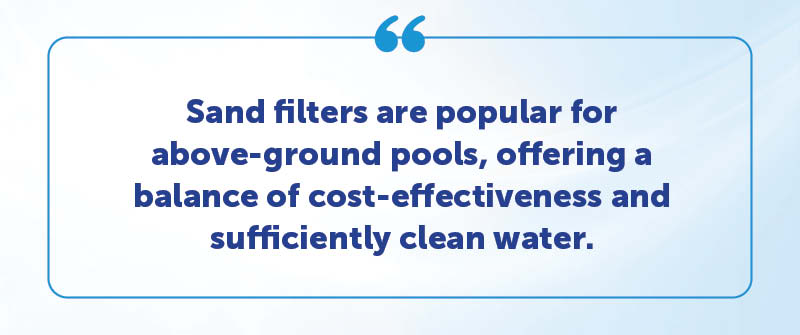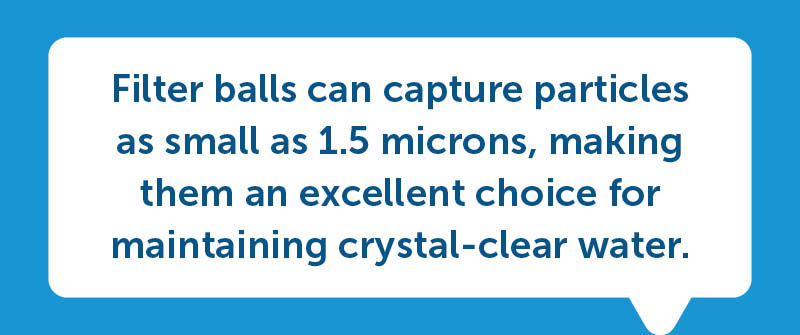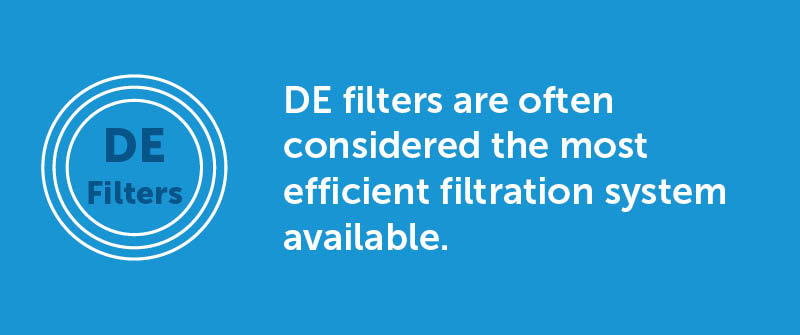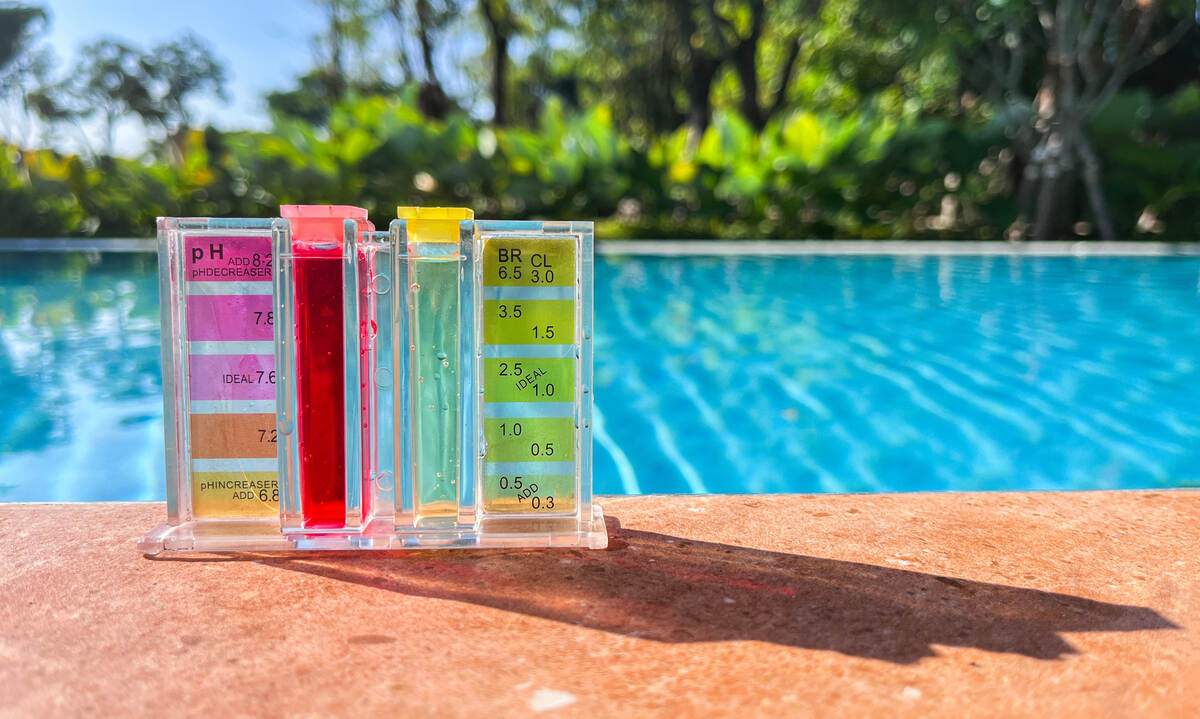What Type Of Pool Filter Is Most Effective?
When it comes to keeping your pool water clean and clear, choosing the right pool filter system is crucial. There are three main types of pool filters: sand, cartridge, and diatomaceous earth (DE). Each type has distinct advantages and is suited for different pool needs. These filter systems are designed to effectively filter debris and contaminants, ensuring your pool remains clean and safe.
Overview Of Pool Filter Types: Sand, Cartridge, DE
Sand filters are the most common type used by pool owners due to their simplicity and affordability. Sand pool filters are effective in trapping contaminants as water flows through a tank filled with sand, capturing debris within the 20 to 40 microns range. They use #20 silica sand to trap debris as water passes through. Cartridge pool filters consist of a small filtration cartridge and are known for their ease of maintenance and water-saving features. Diatomaceous Earth (DE) filters offer the most effective filtration, removing particles as small as 3-5 microns. DE filters use fossilized remains of diatoms as the filter medium.
Effectiveness Of Each Type In Cleaning And Maintaining Pool Water
Each filter’s effectiveness depends on its ability to trap debris and ease of maintenance, making them some of the best pool filters available. Sand filters can remove particles down to 20 microns, while cartridge filters capture particles as small as 10 microns. DE filters provide the finest filtration, capturing particles down to 3 microns, which is ideal for those prioritizing water clarity. Maintaining the pool’s water quality is essential, and choosing the right filter can make a significant difference.
Comparative Analysis Of Efficiency Across Different Pool Types (In-Ground vs. Above-Ground)
For in-ground pools, DE filters are often recommended due to their superior cleaning capability. However, their higher cost and maintenance might lead some homeowners to opt for cartridge filters. Sand filters are popular for above-ground pools, offering a balance of cost-effectiveness and sufficiently clean water. It’s also important to ensure that the pool pump is appropriately sized to match the filter, as this will ensure proper water flow rates and overall filtration efficiency.

What Pool Filter Is Better, Sand Or Cartridge?
Sand filters and cartridge filters are two of the most popular choices when it comes to pool filtration, each with its own set of advantages and disadvantages. Understanding the nuances of each type will help you decide which is the best fit for your pool, whether it’s in-ground or above-ground. Unlike sand filters, cartridge pool filters do not require backwashing, making them a more convenient option for many pool owners.
Advantages And Disadvantages Of Sand Filters
Sand filters are known for their durability and ease of use. Pool filter sand is essential for optimal filtration, but it degrades over time and needs to be replaced periodically. They operate by pumping water through a bed of filter sand that traps debris. Pros of sand filters include low maintenance requirements and a long lifespan. They are often less expensive initially and they can last between 5 to 7 years before the sand needs replacement. Cons include less precision when it comes to filtering out fine particles. They typically remove debris down to about 20 microns, which may not be adequate for pools requiring highly polished, crystal-clear water.
Pros And Cons Of Cartridge Filters
Cartridge pool filters use a reusable cartridge to trap particles as small as 10 to 15 microns, offering superior water clarity compared to sand filters. Pros include their ability to provide finer filtration and their ease of installation. They consume less backwash water and are more environmentally friendly. However, their cons involve frequent maintenance; they require cleaning several times a year and typically need replacement every 1 to 2 years, which can be costlier over time. Additionally, their upfront cost can be higher than sand filters.
Situational Effectiveness Based On Pool Size And Usage
Choosing between sand and cartridge filters often depends on the size and type of your pool and how you use it. For larger pools or those with heavy usage, a cartridge filter might be more effective due to its finer filtration ability. Conversely, for small to medium-sized pools or seasonal pools, sand filters might suffice due to their lower maintenance and cost. Ultimately, the choice may come down to personal preference, budget considerations, and the level of water clarity required. For those considering a sand filter, options like the Pentair Triton II Side Mount Sand Filter offer ease of use and maintenance efficiency.
Do Filter Balls Work As Good As Sand?
The emergence of filter balls as an innovative pool filtration solution has sparked considerable interest among pool owners. Designed as an alternative to traditional sand filters, filter balls promise enhanced pool cleaning efficiency and reduced maintenance efforts.
Introduction To Filter Balls
Filter balls are made from polyethylene fibers and can efficiently trap debris, dirt, and impurities that might cloud your pool’s water. Unlike sand, which is heavier and denser, these lightweight filter balls are designed to optimize water flow through the filter system, potentially enhancing filtration quality.
Comparison Of Cleaning Efficiency
While traditional sand has been a staple in pool filtration for its effective removal of larger particles, filter balls provide superior filtration due to their ability to trap fine particles and oils. With their unique composition, filter balls can capture particles as small as 1.5 microns, making them an excellent choice for maintaining crystal-clear water.
Moreover, the enhanced filtration process means that filter balls can significantly reduce backwashing frequency, conserving water and saving time. For many homeowners, this can translate into a more sustainable and efficient pool filter system.

Cost-Effectiveness And Maintenance
In terms of cost, although the initial expense of acquiring filter balls might be higher than sand, their benefits over time can outweigh this. Since they last several pool seasons and require less maintenance, filter balls tend to offer long-term savings. Additionally, they are easier to handle and replace, simplifying the maintenance process.
Before switching from sand to filter balls, consider compatibility with your existing filter system and assess the long-term benefits versus initial costs. Many homeowners find that the investment in the best pool filter media like filter balls enhances their overall pool experience.
What Is The Most Effective Type Of Water Filter?
Understanding Water Filtration Technologies In Pool Systems
When it comes to maintaining a clean and healthy pool environment, having the right water filter systems is crucial. There are several technologies available, each designed to meet specific needs and conditions. Understanding these technologies not only ensures optimal cleanliness and clarity but also enhances the overall balance of your pool water.
Sand Filters
Sand filters are among the most common types of pool filters. Their working process involves passing water through a sand bed that traps any dirt and debris. While sand filters have been traditionally popular due to their durability and low maintenance, they may not provide the finest filtration compared to other types. They excel, however, in larger pools where capacity is a crucial factor.
Cartridge Filters
Cartridge pool filters function by passing water through a filter cartridge that captures debris down to a few microns. These filters are known for their superior cleaning ability and require less water for maintenance. They’re particularly effective in environments with finer debris and in pools where water conservation is a priority.
Diatomaceous Earth (DE) Filters
DE filters are often considered the most efficient filtration system available. They use a fine powder made from fossilized remains that can filter out particles as small as 3-5 microns, providing unparalleled clarity. However, they do require more maintenance and can be more expensive upfront.

Choosing The Right Filter For Your Pool
When selecting the appropriate filtration technology, consider the types of pool filters for inground pools as well as for above-ground systems. Assess your needs based on pool size, frequency of use, and maintenance preferences. For instance, if you have an in-ground pool with substantial usage, investing in a DE filter could ensure the best results in water clarity and balance. However, for those looking for low maintenance, a cartridge filter might be more suitable. For any swimming pool, selecting the right filter is essential to maintain water clarity and hygiene.
If you’re striving for perfect water quality, look no further. DiscountFilters.com brings you the best pool filter system solutions, offering superior water clarity at affordable costs. Our selection caters to both inground and above-ground pools, helping you pick the right filter with ease. Transform your pool maintenance today with filters that promise both quality and convenience.

